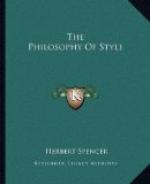“As when a child, on
some long winter’s night,
Affrighted, clinging to its
grandam’s knees,
With eager wond’ring
and perturb’d delight
Listens strange tales of fearful
dark decrees,
Mutter’d to wretch by
necromantic spell;
Or of those hags who at the
witching time
Of murky midnight, ride the
air sublime,
And mingle foul embrace with
fiends of hell;
Cold horror drinks its blood!
Anon the tear
More gentle starts, to hear
the beldame tell
Of pretty babes, that lov’d
each other dear,
Murder’d by cruel uncle’s
mandate fell:
Ev’n such the shiv’ring
joys thy tones impart,
Ev’n so, thou, Siddons,
meltest my sad heart.”
40. Here, from the lapse of time and accumulation of circumstances, the first part of the comparison is forgotten before its application is reached, and requires re-reading. Had the main idea been first mentioned, less effort would have been required to retain it, and to modify the conception of it into harmony with the comparison, than to remember the comparison, and refer back to its successive features for help in forming the final image.
41. The superiority of the Metaphor to the Simile is ascribed by Dr. Whately to the fact that “all men are more gratified at catching the resemblance for themselves, than in having it pointed out to them.” But after what has been said, the great economy it achieves will seem the more probable cause. Lear’s exclamation—
“Ingratitude! thou marble-hearted fiend,”
would lose part of its effect were it changed into—
“Ingratitude! thou fiend with heart like marble;”
and the loss would result partly from the position of the simile and partly from the extra number of words required. When the comparison is an involved one, the greater force of the metaphor, consequent on its greater brevity, becomes much more conspicuous. If, drawing an analogy between mental and physical phenomena, we say, “As, in passing through the crystal, beams of white light are decomposed into the colours of the rainbow; so, in traversing the soul of the poet, the colourless rays of truth are transformed into brightly tinted poetry”; it is clear that in receiving the double set of words expressing the two halves of the comparison, and in carrying the one half to the other, considerable attention is absorbed. Most of this is saved, however, by putting the comparison in a metaphorical form, thus: “The white light of truth, in traversing the many sided transparent soul of. the poet, is refracted into iris-hued poetry.”
42. How much is conveyed in a few words by the help of the Metaphor, and how vivid the effect consequently produced, may be abundantly exemplified. From ‘A Life Drama’ may be quoted the phrase—
“I spear’d him with a jest,”
as a fine instance among the many which that poem contains. A passage in the ‘Prometheus Unbound,’ of Shelley, displays the power of the metaphor to great advantage:




